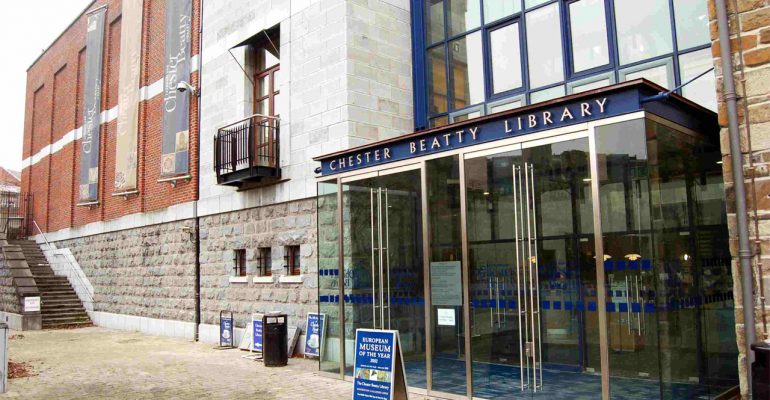The Chester Beatty Library
May 15, 2017 2023-08-24 19:26The Chester Beatty Library

The Chester Beatty Library
The Islamic Collections
The Chester Beatty Library contains a world famous collection of manuscripts, prints, miniature paintings, early printed books and objets d’art from countries across Asia, the Middle East, North Africa and Europe. The Collection is principally focused on the written word and its associated painted and printed images.
The Chester Beatty Library is one of Ireland’s national cultural institutions. It is a public charitable trust established under the will of the late Sir Alfred Chester Beatty and is governed by a Board of Trustees. Our mission is to maintain and preserve the Library’s collections and to make them available in the most appropriate ways for the use and enjoyment of the public and for scholarly study and research, in order to promote a wider appreciation and understanding of the international cultural heritage embodied in the collections and to foster relations between Ireland and the peoples whose cultures are represented in the collections.
The Islamic Collections include over 6,000 individual items, mainly manuscripts in Arabic, Persian and Turkish and single-page paintings and calligraphies, supplemented by a small assortment of objects, dating from the late eighth to the early twentieth century. They include some of the greatest documents of Islamic art and culture ever produced.
The Library’s Islamic manuscripts are amongst the finest in existence and are internationally renowned for the overall high quality and scope of the material. Together they illustrate in exquisite form and detail the history and development of all aspects of the Islamic book: calligraphy, illumination, miniature painting and bookbinding.
Overview of the Project
Seal impressions provide valuable information on the history of a manuscript and this database is intended as a convenient means by which to find or share that information. We hope the database will serve as a useful resource for anyone working on Islamic manuscripts.
Seals are usually inscribed with the name of an individual, often in conjunction with a pious phrase, and are used in manuscripts to denote ownership. Knowing who the individual named is and when and where that person lived can help one to trace the history of a manuscript, which may in turn shed light on notes and commentaries added or other alterations made to the manuscript since it was first produced. However, the individual or institution named is often unknown to the researcher or the text may not be easily deciphered: the ink may be smudged or otherwise unclear or the script itself might be difficult to read. Therefore, as a visitor to the site, you are invited to participate in deciphering the seals, identifying the individuals or institutions named, and adding information such as other sources of the same seal impression or other seals that name the same individual or institution. As there is currently no convenient means by which to find or share information on seal impressions, we hope that this database will be a useful resource for anyone working on Islamic manuscripts.
Scope of the Project
Initially the database will contain mainly images of seal impressions found in the more than 2600 manuscripts that make up the Chester Beatty Library’s Arabic Collection. The number of images will increase steadily until the seals in all of these manuscripts are included as well as all of those found in the Library’s other Islamic manuscripts (those in its Qur’an, Persian, Turkish and Mughal-era Indian Collections). We are happy to include seals from other collections if proper permission to do so and photographs are provided. We may be contacted at islamicseals@cbl.ie.
The initial phase of the project has been generously funded by The Islamic Manuscript Association.
For more information on the Chester Beatty Library, its holdings and a full schedule of events and activities please visit www.cbl.ie








